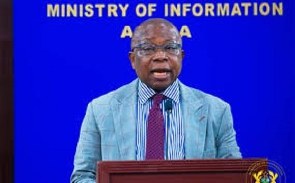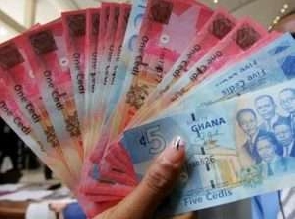Kwaku Agyemang Manu, until Wednesday, February 14, 2024, was the sector minister for health in Ghana.
He was among the thirteen ministers who lost their jobs after President Nana Addo Dankwa Akufo-Addo decided to shake up his government.
He, along with the finance minister, Ken Ofori-Atta, and the roads and highways minister, Kwaku Amoako-Atta, were the high-profile names in the reshuffle.
While some media reports indicate that Ken Ofori Atta will get a new role as the president's senior economic advisor, Kwaku Agyemang Menu and others are out for various reasons.
Kwaku Agyemang Manu received several commendations for his work to enhance the health sector since he became the health minister in 2017, but he has also faced criticism for some contentious choices and actions.
This report highlights some of the controversies that marked Kwaku Agyemang Manu's time as health minister.
Making payment for vaccines that were not delivered
Ministry of Health, under the leadership of Kwaku Agyemeng Manu in 2020, paid UNICEF/AVAT over 120 million dollars for Coronavirus vaccines but failed to receive all vaccines from the supplier.
"Ministry of Health, on behalf of the Government of Ghana, paid an amount of US$120,192,379.80 to UNICEF/AVAT for the supply of vaccines. However, 5,109,600.00 doses of vaccines valued at US$38,322,000.00 were supplied to the National Cold Room, leaving a difference of US$81,870,379.80 with UNICEF/AVAT," the 2022 Auditor General’s report stated.
This led to public agitation, with critics demanding the retrieval of the over US$80 million at UNICEF/AVAT and also calling for heads to roll.
The report also noted that records on COVID-19 funds at the Ministry of Finance, Controller and Accountant-General and Ministry of Health indicated that the Ministry of Finance mobilised a total amount of GH¢19,112,318,205.12 in 2020 to mitigate the impact of the COVID-19 pandemic.
The records showed that an amount of GH¢1,978,551,137.46 was mobilised in 2021 and GH¢753,319,842.66 (up to June 2022) to finance the Coronavirus Alleviation Programme and the implementation of the Ghana COVID-19 Emergency Preparedness and Response Plan.
In all, a total amount of GH¢21,844,189,185.24 was mobilised to mitigate the impact of the COVID-19 pandemic.
Allowing Frontier Health Service Limited to operate without a licence during COVID-19
Kwaku Agyemang Manu, appearing before the appointment committee in 2021, explained the decision to allow Frontier Health Service Limited to start testing for COVID-19 at the Kotoka International Airport (KIA) before eventually being licensed.
During his vetting, Agyemang Manu admitted to a question posed by North Tongu MP Samuel Okudzeto Ablakwa that the company was allowed to start operating when it had not been granted a permit.
The North Tongu MP said the company started operating on September 1, 2020 but was licensed on November 3, the same year, after it had already commenced operations.
In answering, the Health Minister-designate at the time explained: “In the pandemic, we had a phrase we were using. We said that we were not in normal times.
“There were certain things that we had to do and try to rectify as we go forward because of the urgency of the situation."
Shortage of HIV, Child, COVID vaccines
The Minister for Health Kwaku Agyemang Manu, on January 10, 2023, stated that the vaccine shortage in the country was due to accumulated debts at the Ministry.
He said: “I stand here and assure the House that within two to three weeks, we will get vaccines, probably before that period or timeframe.
“I can’t lay my hand on specific dates, but even probably before that, we may get the vaccines earlier than two weeks.”
The Minister explained that: “Throughout the period, we have paid close to $6.4 million equivalent to UNICEF who supplies us the vaccine.”
He further explained: “At the time when I went to the ministry, I was so worked up trying to negotiate with our donors to give us vaccines while we started paying for the rest.
“We inherited over 15.8-million-dollar equivalent in vaccines, and we even had recorded close to about 358 infections in that particular year, 2016.”
The Health Minister assured the House that the vaccine shortage will not happen again.
“The assurance I will give and I can give for the first time in the Chamber is that this will not happen again, and I will advise that you help me in my advocacy to get adequate funding for vaccines,” the Minister appealed to Parliament.
Banter between Korle Bu Hospital and the Ministry of Health over the Renal Unit closure
In the wake of the high cost of dialysis in Ghana, the Korle Bu Teaching Hospital (KBTH) resorted to closing the Renal Unit as it was not able to fund the operations of the unit.
The ministry moved to instruct the hospital to reopen the unit to treat patients with kidney failure.
According to the health ministry, the management of the Korle-Bu Teaching Hospital failed to use the right channels and procedures before the decision to increase their fees.
The ministry further stated that the leadership is yet to have this move by Korle-Bu reported to them.
This was communicated by the Head of Public Relations at the health ministry, Isaac Ofie, according to a cictinewsroom.com report.
“Before you increase [fees], there is a need for proper procedure or caution to be taken, extending the proposal or the proposed price to Parliament for approval, thus the fees before you charge. But this has not gotten to us yet, and even if it has gotten to the ministry, it should be before Parliament and Parliament will have to approve that before it is charged,” Ofie said at the time.
The PRO for the hospital, Mustapha Salifu, explained that the decision to increase the cost of dialysis was because the government had cut off the support it was giving to the Renal unit of the hospital.
However, the hospital subsequently released another statement to counter the claims of an increase in dialysis fees, which was making rounds on social media.
Ghana’s leading digital news platform, GhanaWeb, in conjunction with the Korle-Bu Teaching Hospital, is embarking on an aggressive campaign which is geared towards ensuring that parliament passes comprehensive legislation to guide organ harvesting, organ donation, and organ transplantation in the country.
NW/DO
Click here to follow the GhanaWeb General News WhatsApp channel
You can also watch the latest episode of Everyday People on GhanaWeb TV below:
Click to view details



General News of Thursday, 15 February 2024
Source: www.ghanaweb.com

















